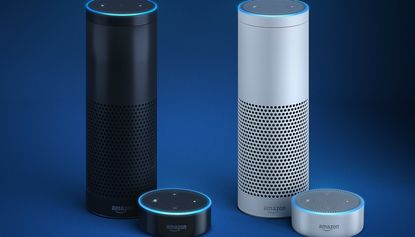Amazon axes ‘sexist’ AI recruiting tool
Program was reportedly biased against women

Amazon has reportedly scrapped a recruitment tool powered by artificial intelligence (AI) that showed a clear bias against women.
Company insiders told Reuters that the program had been in development since 2014 as a means of streamlining the recruitment process.
“Everyone wanted this holy grail”, one of the sources said. The system was designed to sift through 100 job applications and “spit out” the top five results.
Subscribe to The Week
Escape your echo chamber. Get the facts behind the news, plus analysis from multiple perspectives.

Sign up for The Week's Free Newsletters
From our morning news briefing to a weekly Good News Newsletter, get the best of The Week delivered directly to your inbox.
From our morning news briefing to a weekly Good News Newsletter, get the best of The Week delivered directly to your inbox.
The machine gave each applicant a rating out of five, “much like shoppers rate products on Amazon”, says the news site.
The AI was trained to use a method known as machine learning. This allowed researchers to feed the program old CVs from the past ten years to use as reference material so the AI could accurately grade real-life job applications, the BBC says.
But the data submitted came primarily from former male applicants, meaning the “sexist” AI taught itself that “male candidates were preferable”, the broadcaster reports.
The bias was discovered in 2015 when recruiters found that the AI system wasn’t rating applicants in a gender-neutral way. The program was penalising CVs with the word “women” in them, putting female applicants who had studied at women’s colleges, for example, or written “women’s chess club captain” in their list of achievements at a disadvantage.
Programmers subsequently amended the system to remove the bias but this was not a complete success, according to Fortune. The AI was abandoned last year.
Amazon declined to comment on the technology, but said the tool “was never used by Amazon recruiters to evaluate candidates.”
Has the AI hindered female job applicants?
Amazon insiders insist it hasn’t.
Speaking to The Sun, Amazon sources said the retail giant “never based recruitment decisions on the tool's ratings alone”, but recruiters did examine the AI’s recommendations when sifting through applications.
This isn’t the first time an AI programme has been shown to favour men over women.
Facebook came under fire last month after it emerged that AI systems had been preventing women from seeing certain job advertisements, the newspaper says.
Create an account with the same email registered to your subscription to unlock access.
Sign up for Today's Best Articles in your inbox
A free daily email with the biggest news stories of the day – and the best features from TheWeek.com
-
 Pros and cons of solar energy
Pros and cons of solar energyPros and cons Solar power could become the primary source of electricity worldwide by 2050 – but there are still clouds in the forecast
By Rebecca Messina, The Week UK Published
-
 Post Office's Capture software to be reviewed over 'glitches'
Post Office's Capture software to be reviewed over 'glitches'Speed Read Solicitor representing accused postmasters says flaws in the IT system follow 'very similar pattern' to Horizon
By Arion McNicoll, The Week UK Published
-
 How would we know if World War Three had started?
How would we know if World War Three had started?Today's Big Question With conflicts in Ukraine, Middle East, Africa and Asia-Pacific, the 'spark' that could ignite all-out war 'already exists'
By Harriet Marsden, The Week UK Published
-
 AI is causing concern among the LGBTQ community
AI is causing concern among the LGBTQ communityIn the Spotlight One critic believes that AI will 'always fail LGBTQ people'
By Justin Klawans, The Week US Published
-
 When even art is artificial
When even art is artificialOpinion The AI threat to human creativity
By William Falk Published
-
 Amazon ending 'Just Walk Out' grocery checkout
Amazon ending 'Just Walk Out' grocery checkoutSpeed Read In its place, the company will let customers scan while they shop with Amazon Dash Cart
By Peter Weber, The Week US Published
-
 The push for media literacy in education amid the rise of AI
The push for media literacy in education amid the rise of AIIn the Spotlight A pair of congresspeople have introduced an act to mandate media literacy in schools
By Justin Klawans, The Week US Published
-
 The complex environmental toll of artificial intelligence
The complex environmental toll of artificial intelligenceThe explainer AI is very much mostly not green technology
By Devika Rao, The Week US Published
-
 Artificial history
Artificial historyOpinion Google's AI tailored the past to fit modern mores, but only succeeded in erasing real historical crimes
By Theunis Bates Published
-
 AI is recreating the voices of mass shooting victims
AI is recreating the voices of mass shooting victimsThe Explainer The parents of these victims are using the AI to try and lobby Congress for gun control
By Justin Klawans, The Week US Published
-
 The murky world of AI training
The murky world of AI trainingUnder the Radar Despite public interest in artificial intelligence models themselves, few consider how those models are trained
By Austin Chen, The Week UK Published